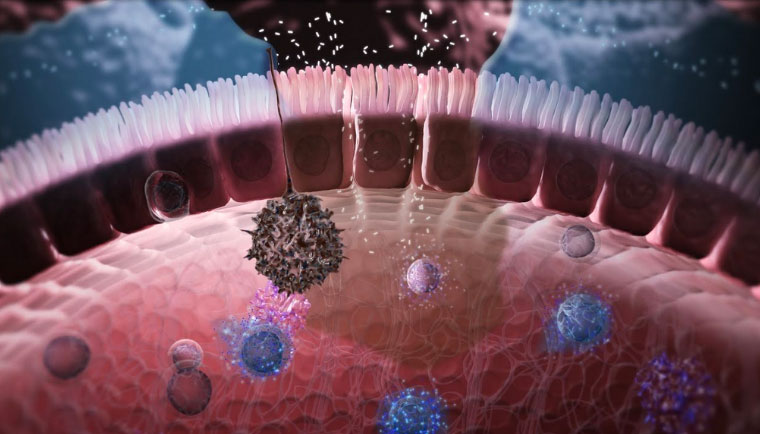Akkermansia Muciniphila Induces Intestinal Adaptive Immune Responses during Homeostasis
By Dr. Katie E Golden, MD

While it is well known that Inflammatory Bowel Disease (IBD) pathogenesis is rooted in inappropriate immune system activation and aberrant T cell responses, scientists are working hard to increase our understanding of the specific factors and mechanisms that account for this immune dysregulation. The more recent explosion of microbiome research has shown that the interaction between a host immune system and intestinal commensal bacteria, during both dysbiosis and homeostasis, has important implications for both development and progression of clinical disease. If scientists can elucidate the key species and inflammatory mechanisms that incite development of the mucosal barrier dysfunction that underlies IBD, this could be a critical step in developing interventions that prevent development of the disease.
In a recently published study in Science, investigators address this gap in understanding and show how Akkermansia Muciniphila (a intestinal bacteria) induces T cell-dependent immunoglobulin production in mice. The authors first compared wild-type and T cell-deficient mice to examine serum antibody binding to intact commensals, and observed an undiscovered microbiota-reactive IgG antibody response that was T cell dependent. This humoral reaction, furthermore, was specific to only a small fraction of gut commensals (unlike the broader recognition seen in T-cell independent immunity responses). Through further DNA sequencing, they were able to identify A.Muciniphila as one of two IgG targets. This species sparked interest given it has previously shown to have protective effects in diet-induced obesity, promote mucosal wound healing, and enhance antitumor responses in immunotherapy. The mechanisms by which it promotes these protective cellular mechanisms, however, remains unknown.
Researchers performed several rounds of subsequent experiments to confirm that the bacteria induced a species-specific humoral response, and that these specific antigens were produced under homeostatic conditions. Using gnotobiotic mouse models and T cell hybrids, they observed that the immune response to A.Muciniphila was limited to T follicular helper cells in Peyer’s Patches (and did not engage other T cell lineages or the lamina propria), deviating from previously described T-cell activating commensal bacteria. Subsequent experiments in conventional mice revealed high variability in antibody levels, thus suggesting a context dependent immune response.
While prior work had established a correlation between A.Muciniphila and host immune function, this study uncovers unique immune pathways that are activated by a bacteria-induced T cell response. Their results provide an opportunity and direction for future investigations to examine systemic effects of the described cellular pathways, and thus clinical implications for modulation of this specific immune response.
1. Ansaldo, E. et al. Akkermansia muciniphila induces intestinal adaptive immune responses during homeostasis. Science (New York, NY) 364, 1179–1184 (2019).

